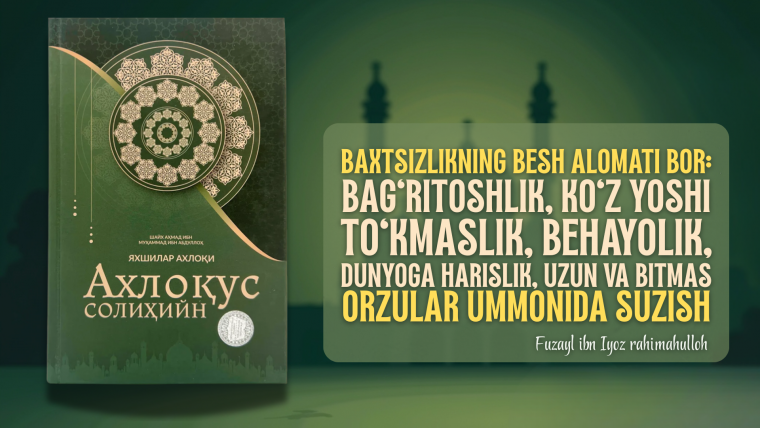
Бисмиллаҳир Роҳманир Роҳийм
Мурид учун зарур шартлардан бири Аллоҳ олдидаги бурчини бажаришда йўл қўйган хатолари учун кўнглини ҳаё олови билан доимий ёқишидир.
Фузайл ибн Иёз дейдилар: “Бахтсизликнинг беш аломати бор: бағритошлик, кўз ёши тўкмаслик, беҳаёлик, дунёга ҳарислик, узун ва битмас орзулар уммонида сузиш”.
Донолар демишлар: “Инсонни Аллоҳдан қўрқув ва ҳаё тарк этган бўлса унда бошқа ҳеч қандай яхшилик қолмайди”.
Банданинг Аллоҳдан қай даражада ҳаё қилиши унинг иймони ва дунёга бўлган муҳаббати миқдоридан келиб чиқиб белгиланади.
Улуғлар демишларки: “Ҳаё ва унс (хотиржамлик) кўнгил эшигини қоқиб кўради. Агар унда зуҳд (дунё севгисидан воз кечиш) ва вараъ (парҳезгорлик)ни топишса қўним топадилар, акс ҳолда тарк этадилар”.
Аллоҳ марҳамат қилади: “Батаҳқиқ, (хотин) унга интилди. У ҳам, агар Роббининг бурҳон-ҳужжатини кўрмаганида, (хотинга) интилар эди” (Юсуф сураси, 24-оят).
Бурҳон-ҳужжат ҳақида айтилганки: “Зулайҳо либоси билан хона бурчагида турган бут устини ёпиб қўйди. Буни кўриб Юсуф алайҳиссалом ундан: “Нима қиляпсан?”– деб сўраганларида аёл: “Бунинг олдида гуноҳ қилишга уяламан”, – деб жавоб берди. Шунда Юсуф алайҳиссалом: “Менинг Аллоҳим ҳаё қилишлигим учун бу жонсиз бутдан кўра муносиброқ эмасми?!” – дедилар".
“Ахлоқус солиҳийн” (Яхшилар ахлоқи) китобидан
Йўлдош Эшбек, Даврон Нурмуҳаммад
таржимаси.